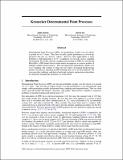Kronecker determinantal point processes
Author(s)
Mariet, Zelda Elaine; Sra, Suvrit
DownloadPublished version (167.9Kb)
Publisher Policy
Publisher Policy
Article is made available in accordance with the publisher's policy and may be subject to US copyright law. Please refer to the publisher's site for terms of use.
Terms of use
Metadata
Show full item recordAbstract
© 2016 NIPS Foundation - All Rights Reserved. Determinantal Point Processes (DPPs) are probabilistic models over all subsets a ground set of N items. They have recently gained prominence in several applications that rely on "diverse" subsets. However, their applicability to large problems is still limited due to O(N3) complexity of core tasks such as sampling and learning. We enable efficient sampling and learning for DPPs by introducing KRONDPP, a DPP model whose kernel matrix decomposes as a tensor product of multiple smaller kernel matrices. This decomposition immediately enables fast exact sampling. But contrary to what one may expect, leveraging the Kronecker product structure for speeding up DPP learning turns out to be more difficult. We overcome this challenge, and derive batch and stochastic optimization algorithms for efficiently learning the parameters of a KRONDPP.
Date issued
2016-12Department
Massachusetts Institute of Technology. Computer Science and Artificial Intelligence LaboratoryJournal
Advances in Neural Information Processing Systems
Citation
2016. "Kronecker determinantal point processes." Advances in Neural Information Processing Systems, 0.
Version: Final published version